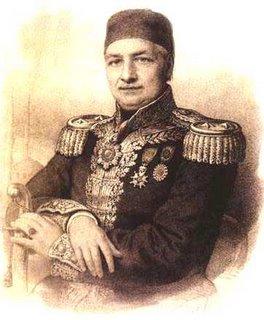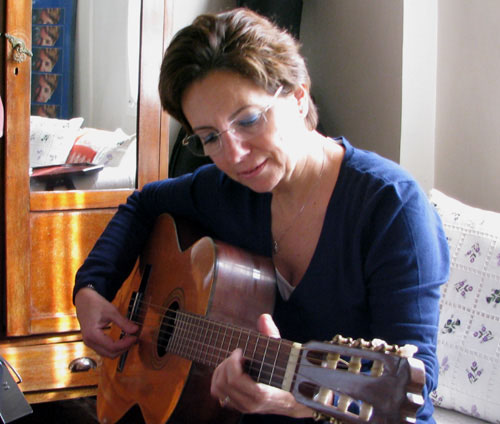The Legacies
Architectural heritage | Literature | Fine arts | Music
| Sports | Intellectual life
The musical arts in Turkey has also benefitted from the contribution of long term resident foreign musicians whether as performers or researchers and in some cases having a top role in the Ottoman palace and helping to catalogue Ottoman court music and introduce elements of European music, such as in the case of Giuseppe Donizetti:
 |
Giuseppe Donizetti
Interview conducted with Maria Rita Epik, February 2011 | Interview conducted with Livio Angelisanti, March 2011
1- How long have you run your music school, how long have you been singing? Who discovered you?
This year is the 21st school year. I started my school on the 29th September, 1990. I have been singing for as long as I can remember. I have been singing with my guitar since 1970. No one has discovered me. The son-in-law of my Aunt, Mustafa Besimzade was singing and accompanying himself with his guitar. I just adored that scene and I wanted to do the same. I am basically self- taught. I won the Eurovision Song Contest’s Turkish Preliminarie in 1979. That made me known by the main public.
2- Who influences you the most in your song writing? Who are your favourite singers of today and of the past?
I used to listen to the songs that my sister listened to. They were French, Italian, English and all beautiful songs. We have 12 years of age difference between me and my sister. I was 6 she was 18 so it was the early 60’s.
When I first started to write my songs I was imitating the chord progressions of those songs. Later on I created my own style. I have no particular favourite song writer. Even among the big composers such as Mozart or Bach or Beethoven there are works that I find close to my soul and others that don’t touch me at all. I respect Mina Mazzini [Anna Maria Quaini] for singing still in her 70’s. I believe that Sting is the Last Great Songwriter. I very much like the slow songs of Elton John and Billy Joel, the Air on G String of Bach the song Edelweiss from Sound of Music. And many others. So as you see it’s not one particular person or persons but mainly particular works. My idol is Leonard Bernstein. I met him when I was in Los Angeles. I liked him very much as a person. I like very much his musical West Side Story. I like him for his contribution to the Music World with his Young People’s Concerts.
3- Does Turkey have a healthy music scene, does it promote young talent. Is the system fair?
Capitalism affected the entire world not only Turkey. So, musicians are trying to write songs that will sell.
What would you expect from a Young Talent? What does the System expect? What must a song tell? Is it a work of art or is it just a very shallow music? Someone said about Serge Gainsbourg “a Major Artist of a Minor Art.”
I consider Songwriting as a Major art though. As it is mentionned in Sunset Boulevard it’s the scene! that got small unfortunately.
4- What could be done to improve the system of promoting music, whether it is pop or traditional? In your opinion does the Ministry of Culture perform this task effectively?
The whole mentality must change. I just hope that people will be fed up with all the shallow music that they listen today and ask for more genuine music. If the State prepares a surrounding of good music for all young Turkish students things may change. But I think it’s impossible. I never forget my experience at the National Gallery of Art in London one day. There were a group of kindergarden students looking at Rembrandt’s work of art. The teacher was teaching them how to look by asking them questions like “what colour is the carpet. Who has fringes? Education starts at a very early age. If young people are exposed to “good music” from an early age and by this I don’t mean only “classical music” then that is what they will ask for as adults.
5- Your songs are often one of loss and longing. Do you think songs of sadness can ironically also uplift the human spirit and help people deal with the trials and tribulations of life?
The CD that you have listened to is only 1/15th of my songs. Not all my songs are based on this theme. Yet, the loss of my mother at a very young age has effected me to this very day.
These songs can help you in the sense that you know that you are not the only one who feels that way. That there is a Turkish Levantine woman out there who feels the same. It can also help you in the sense that it can be an expression of your feelings you were never able to express.
6- Your ancestors chose Izmir as a place of residence and you still live here. Is this positive choice important to you?
Sometimes I want to move to a place like Canada where no great tragedy has affected the main Karma of the whole. I am tired of feeling sad of all the great losses that have happened in the past.
7- In your opinion what does Izmir do best, and what does it lack in projecting itself to the world?
It’s an open minded society mainly. Unfortunately when our generation is gone the new generations will not know that Levantines or Greeks or Jews had existed here. On the whole I believe that there is a lack of coordination and organization between policy makers. Izmir still does not have a magazine like “Time Out London”.
8- Do you think your Levantine identity offer you a sharper perspective on the heritage of Izmir’s past and so place your art in a deeper context? Do you feel a weight of responsibility as the sole Levantine singer of Turkey?
Of course! No doubt about that! I feel a responsibility as a human being, as an artist, as a woman. Unfortunately no one is aware of Levantines not even the Levantines. I wish I had had more Levantine students in my school.
9- Do you think music and art are given enough venues and support in Izmir? Do you also think the 1922 events and the loss of a significant proportion of the former human mosaic of Izmir has caused a curtain of denial to the past artistic achievements of the city?
İstanbul is a huge tumor thas is sucking life not only out of İzmir but mainly out of all other cities in Turkey. This means that all young people, artists, musicians, entrepreneurs etc. are moving to İstanbul. This results in a lifeless, aging, retiring people’s city. The greatest museums are in İstanbul, the greater exhibitions are held there. The money is there, the greatest concerts are held in İstanbul because the wealthiest people to sponsor the events are there.
1922 is the greatest loss of İzmir is every sense but it is not the only one.
10- Do you know when and where your various family branches came from and why to Turkey? Was a relative a ‘mentor’ to you in your early years?
My Greek grandmother Hariklia Divari was a “Smirni.”
My parental grandmother Adele Lorenz was Austo-Hungarian. Her grand-father was either a doctor or other “health” worker in an Austro-Hungarian battleship. When the ship docked in Izmir he went to a Ball and he fell in love with the daughter of the translator who was working at the Austro-Hungarian Consulate.
My 2 grandfathers were Italian. Both also born in Izmir. Giorgio Corsini and Giorgio Tito.
The ancestors of my parental grandfather, from Florence or Genova moved to the Greek island Tinos. They were in the leather business and I think there was a problem in Tinos where they were getting the leather from. He went there to solve “the” problem. When he was there, he fell in love and married a Greek lady. When they had children, they moved to Smyrna I guess for better education for their children. My mother’s father’s ancestors came from Trani. I don’t know their motive for the migration though.
11- If you could go back in time and space, which period and where would you like to live, at least temporarily?
I am always curious about the future. I wish I could live in the future. I wonder if humanity will achieve a more conscious state of mind. I wonder if humanity will achieve peace. But I do not want to be born again! The past has supressed women even more. I don’t think I would have liked to live in the past. But I would have loved to live with and being in the entourage of Mahatma Gandhi.
12- Apart from other singers and their work, what cultural mediums influence you and has the mixture of these artistic expressions close to your heart changed with time?
I love art. My favourite artists have always been the same. Monet, Kandinsky, Klimt. Klimt’s model was a lady called Adele. That is also my dear grandmother’s name who raised me after my mother passed away. I love dance. Mostly modern ballet. I wish I were a good dancer. I adore the sculpture “La Pieta”. I adore the sculpture of “Shakuntala” of Camille Claudel. I have a great respect to all sculptures and sculptors who have survived through time. (The statues in Ephesus etc.) I love the cinema. Again no particular director but films. I love the theatre but I prefer to watch a play in its original language. I love architecture and adore to walk in the streets of Rome, Paris and just observe the work of art in ordinary! houses. I hope I get to see the Taj-Mahal one day.
13- Any future projects you dream of?
I am writing a chidren’s musical I would very much like to finish. My schools sinfonietta, choir and voice students will all take place in it.
I ‘owe’ at least twenty more songs of mine to be published in a CD. I owe this also to myself.
14- Anything you would like to add?
Thank you for everything that you do for the “Levantine Heritage”.
 |
Maria Rita Epik in her school
Maria Rita Epik performing on 24th January 2012 at a concert organised by the Bornova Municipality on the occasion of the anniversary of the assassination of the journalist Uğur Mumcu on this date in 1993. Maria Rita Epik composed this song ‘Peki Ben Niye Öldüm?’ [so why did I die?] that was played simultaneously on all radio stations on the first anniversary of the assassination in 1994.